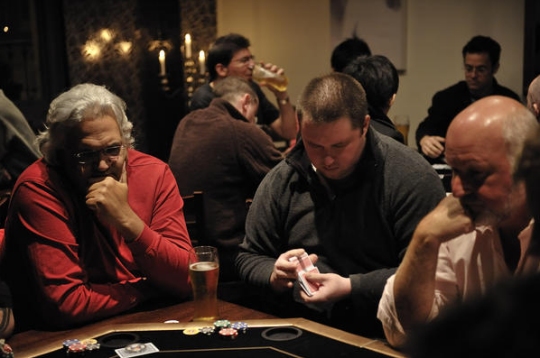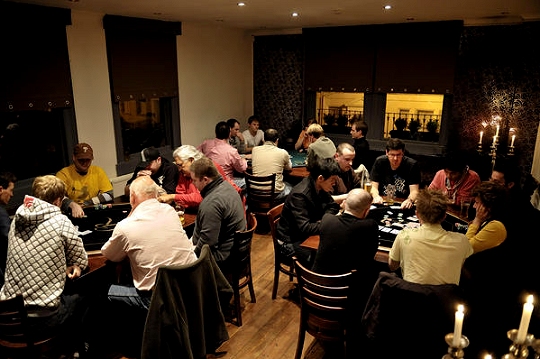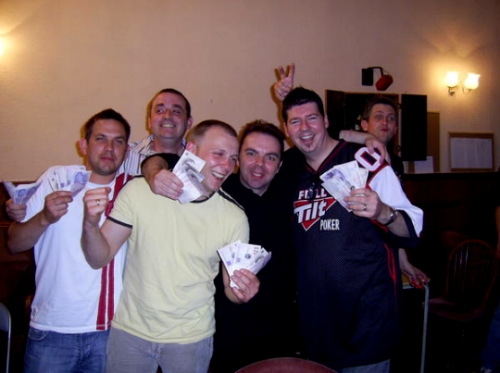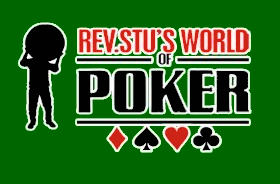|
HOUSE RULES
with The Reverend Stuart Campbell
Well,
viewers, we’ve just about come to the end of House Rules, and it’s
time for you to move out and leave your mother and I in peace to
spend your inheritance. By now your single-table home games should
be running as smoothly as the well-oiled clockwork in a Twinkie
stuck to a baby’s bottom, and if you’ve got any ambition about you
you’ll be itching to expand your poker circle. Most people’s homes
aren’t up to running multi-table games, though (who has two kitchen
tables?), so you’re going to have to get yourself out into the big
bad world.

Live poker: serious.
There
are three main levels of organising multi-table poker games, which
we’re going to look at in detail in the boxouts elsewhere on these
pages, so for now let’s stick to the basics. First you need
somewhere to play, and for most people the most obvious choice is a
local boozer with a private/back/function room. The benefits are
numerous – the room will usually be a decent size, come already
equipped with tables and chairs, and more often than not you’ll be
able to hire it out for free, since the landlord will be delighted
with you bringing a sizeable number of extra drinkers into his pub
all night. (For this reason, either make sure the room has its own
bar or regular visits from bar staff to take orders, or that you
schedule plenty of breaks for your players to go and get drinks. If
the landlord doesn’t make any money you might not be welcomed back.)
The
other main thing you need to think about is staying on the right
side of the law. Since the Gambling Act 2005 it’s been legal to play
poker for money in a pub, but there are some fairly tough limits on
how much you can stake which will probably be too restrictive for
most Poker Player readers. We don’t have space here to reproduce all
of the rules and regulations in full, but the rule-of-thumb version
is that if you’re in a pub, no player can stake more than £5 in
total in any one day and no more than £100 can be staked in total by
all players. (If you’re lucky enough to have access to a private
members’ club the limits are £10 and £250 respectively.) That
effectively rules ring games out entirely unless you’re playing for
1p/2p blinds. You also can’t charge any sort of entry fee or rake.

If you read House Rules,
your humble kitchen table game could turn into one of these.
However, these rules apply to games which are open to the public,
and in practice you can get round them if you’re playing in a
private room and don’t allow people to just walk in and join the
game. If the room is separate from the rest of the pub and you only
allow players who signed up for the game in advance, you’re
effectively running what’s legally considered a “private occasion”
and you should be able to set whatever stakes your players want.
(WARNING: HOUSE RULES IS NOT A LAWYER.)
And
that’s about it. I hope you’ve enjoyed reading House Rules (even the
muppets who wrote outraged letters complaining that we didn’t tell
people to buy £600 ceramic chip sets for casual home poker) and
found it useful. See you at the felt!
|
TAKING IT
TO THE STREETS
|
|
NOW
AND THEN AND AGAIN
The simplest form of multi-table poker is
when you just want to run occasional games with no
over-structure, and for these the only thing the novice
Tournament Director really needs to worry about compared to a
standard home game is keeping the tables balanced, ie making
sure the number of players at each table is as equal as
possible at any given time. It’s an easy thing to lose track
of amid everything else that’s going on, especially if you’re
playing in the game yourself, so make sure you tell everyone
to let you know loudly and clearly when someone is knocked out
on other tables.
There are various conventions for deciding
who gets moved to a new table when numbers need balancing and
there’s no definitively “right” one, but best practice is
generally considered to be to move the player who was about to
be the big blind, and that when there’s more than one seat
available on their new table, they should sit in the first
available seat to the dealer’s left.
(On the rare occasion when you have to move
more than one player at a time, they should sit in the same
order they were on their previous table, ie the one who was
nearest the blinds should still be nearest the blinds on the
new table. Alternatively, it can be fun to just have players
scramble for the most advantageous seat on a
first-come-first-served basis, but this approach is generally
regarded as terribly unprofessional…)
|
|
LET'S MEETUP IN THE YEAR 2000
The second-most-advanced form of the
multi-table game is to organise your players into a group and
maintain an ongoing leaderboard. You can charge people a
membership fee per month or per game attended, with the money
raised going to fund prizes for the eventual overall champion,
or if you’re particularly resourceful you could find a poker
room or local business to sponsor the prizes in return for
some branding/advertising/publicity.
There are dedicated websites set up
specifically to facilitate the organising of groups like this
and which offer a variety of paid-for features – in the
Bristol & South West group (BSWPMG) we use meetup.com - but
you can just as easily run your own group through a website
like Facebook with only a small amount of extra effort.

BSWPMG also runs team
events occasionally, leading to scenes like this.
The most important thing when running an
overall leaderboard is to ensure you implement some sort of
system which means that the person who plays most games isn’t
at an unfair advantage. BSWPMG runs three-month seasons (on
irregular dates) and awards points based on finishing position
and number of runners, and then counts a person’s six best
scores towards the leaderboard, discarding the lowest scores
once somebody’s played more than six games. That way everyone
has a fair chance even if they can’t make every game, but
frequent players always have an opportunity to improve their
scores by replacing a low score with a better one.
|
|
A
LEAGUE OF YOUR OWN
If you’re running
a successful multi-table poker group and turning away players
on a regular basis, the final step is to start your own formal
league running across multiple venues. For this you’ll almost
certainly need to make the games open to the general public,
so you’re going to have to rethink your stakes policy to stay
within the law.
One well-tested
model for this is to make the games free to players, and to
generate the prize money by charging the venues. If you’re
bringing a pub 20+ extra drinkers on a quiet midweek evening
on a weekly basis, you may well find that they’re prepared to
pay you a fee of, say, £2 per player per night (since they’ll
aim to make much more than that in increased business), and
that’ll give you a pretty decent prize pool for a monthly or
bi-monthly final. (Make sure to switch the venue for the final
every month, as an extra sweetener for the pubs.)
If you’ve got
enough players to support such a league, you should also find
that there’s enough in the kitty for replacing worn-out gear
and ultimately also to pay yourself a little bit of a wage for
all your efforts. Congratulations, you’re a professional poker
tournament director! Guaranteed fame and unimaginable riches
await you! [SUB: PLEASE CHECK]
|
The Reverend is Assistant Organiser of the
Bristol & South West
Poker Meetup Group, which runs scheduled single- and
multi-table tournaments and cash games at numerous venues across the
region and is sponsored by Poker.co.uk.

(Click the banner to play with other RSWoP viewers, and earn
RSWoP referral bonuses.)
|

